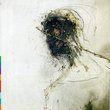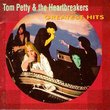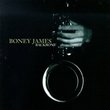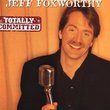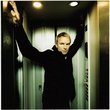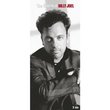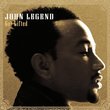| All Artists: Art Blakey, Clifford Brown Title: New York City Birdland Club February 21, 1954 Members Wishing: 1 Total Copies: 0 Label: Giants of Jazz (Ita) Original Release Date: 9/28/1999 Re-Release Date: 12/7/1999 Album Type: Live Genres: Jazz, Pop Style: Bebop Number of Discs: 1 SwapaCD Credits: 1 UPCs: 800488303323, 8004883530335 |
Search - Art Blakey, Clifford Brown :: New York City Birdland Club February 21, 1954
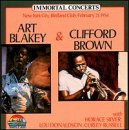 | Art Blakey, Clifford Brown New York City Birdland Club February 21, 1954 Genres: Jazz, Pop
|
Larger Image |
CD DetailsSimilarly Requested CDs
|
CD ReviewsReally freeakin great :) Yuval Shavit | Lexington, MA | 05/30/2000 (5 out of 5 stars) "I'm not much for words, and I doubt people would bother to read what I have to say if it were very long, so I'll just keep it short. The wonderful playing (I'll assume you have some idea about how wonderful these players are; if not, there are hundred of raves here on Amazon) is compounded by that spirit and excitement that seems to only come from live recordings. This is my favorite CD." A Hard Bop Primer M. Allen Greenbaum | California | 10/30/2003 (5 out of 5 stars) "Recorded live at New York's Birdland in February 1954, this is quintessential hard bop with five masters of the genre: the great Clifford Brown (trumpet), Art Blakey (drums), Lou Donaldson (saxophone), Horace Silver (piano), and Curley Russell (bass). The opener, Horace Silver's "Split Kick" (three of his compositions appear on this album exemplifies hard bop's typical ensemble sound with instruments breaking out for swinging solos over a driving beat. There's an excellent, swinging sax solo here and the band sounds tight. The hard-boppists were propelled by hard driving rhythms, over which they played long, searching solos. Solos were sometimes too long, and Brown's trumpet on "Split Kick" would probably have had more impact if cut a bit."Once in a While" features Brown in a thoughtful ballad where his impeccable taste, economical phrasing, and outstanding mastery of tone, time, melody, and improvisation really stand out. It's mostly at a leisurely pace, although Brown lets loose with some of his intense, extended fast riffs too. "Quicksilver" by Horace Silver (following a jazz tradition of eponymous titles) is a fast number showcasing the inventive Lou Donaldson as well as Silver on piano. Donaldson is the hidden gem on this album, his playing is always interesting, and his smooth but muscular tone is a mix of bop and cool jazz. The rhythm section is uniformly effective, yet unobtrusive; Blakey doesn't go as often for the pyrotechnics of, say, Max Roach, yet he adds excellent texture and accent. Rhythm is built through great ensemble playing between drums, bass, and piano, this is exemplified the Gillespie/Paparelli standard, "A Night in Tunisia," with excellent percussion by Blakey. At times, Silver sounds a bit too cerebral on this number (although he's excellent on his third composition, "Mayreh"), and the cut is a bit long at 9 minutes, 13 seconds. A standout here is the J.J. Johnson/ L. Parker "Wee-Dot," a thoroughly successful exemplar of hard bop with uniformly superb playing. This is followed by Lou Donaldson's luscious play on "If I Had You." It's interesting that some of the best hard bop is found in the softer ballads; "The Way You Look Tonight, taken at a fast tempo, is not as enjoyable as the slower "If I Had You' (with the notable of Brown's beautiful and blistering solo). The album closes with two Bird compositions: "Now's the Time" and "Confirmation." The first is taken a little too respectfully, but Donaldson's bop sensibilities come through, while Russell's well-recorded bass gives superb backing.At over 72 minutes, it's a long, sometimes tiring album, but it's one of the best documents we have of the hard bop era. Brown and Donaldson's work is especially memorable. For a live recording, we don't hear much of the audience, and there are no liner notes describing this great performance."
|

 Track Listings (10) - Disc #1
Track Listings (10) - Disc #1